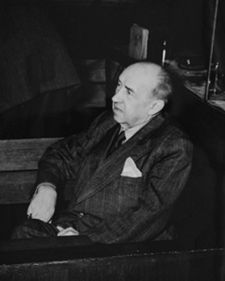Walther Funk
| Walther Funk | |
 |
|
|
Reich Minister of Economics
|
|
|---|---|
| In office January 1938 – April 1945 |
|
| President | Adolf Hitler Führer |
| Chancellor | Adolf Hitler |
| Preceded by | Hermann Göring |
| Succeeded by | (Third Reich collapse) |
|
President of the Reichsbank
|
|
| In office 1939–1945 |
|
| President | Adolf Hitler Führer |
| Chancellor | Adolf Hitler |
| Preceded by | Hjalmar Schacht |
| Succeeded by | None |
|
|
|
| Born | 18 August 1890 Danzkehmen, Kingdom of Prussia, then German Empire, now Russian Federation |
| Died | 31 May 1960 (aged 69) Düsseldorf, North Rhine-Westphalia, Federal Republic of Germany |
| Political party | National Socialist German Workers' Party (NSDAP) |
| Spouse(s) | Luise Schmidt-Sieben |
| Profession | Journalist |
Dr. Walther Funk (18 August 1890 - 31 May 1960) was a prominent Nazi official. He served as Minister for Economic Affairs in Nazi Germany from 1937 to 1945.
Contents |
Early life
Funk was born into a merchant family in Danzkehmen, Kreis Stallupönen, East Prussia. He was the son of Wiesenbaumeister Walther Funk the elder and his wife Sophie (née Urbschat). He studied law, economics, and philosophy at the Humboldt University of Berlin and the University of Leipzig. In World War I he joined the infantry but was discharged as unfit for service in 1916. In 1919 Funk married Luise Schmidt-Sieben. Following the war he worked as a journalist, and in 1922 he became the editor of the center-right financial newspaper the Berliner Börsenzeitung. In 1930 Adolf Hitler appointed him to be one of Germany's members of the board of the newly formed BIS, the Bank of International Settlements.
Political life
Funk, who was a nationalist and anti-Marxist, resigned from the newspaper in the summer of 1931 and joined the Nazi Party, becoming closer to Gregor Strasser who arranged his first meeting with Adolf Hitler. Partially because of his interest in economic policy, he was elected a Reichstag deputy in July 1932, and within the party, he was made chairman of the Committee on Economic Policy in December 1932; a post that he did not hold for long. After the Nazi Party came to power, he stepped down from his Reichstag position and was made Chief Press Officer of the Third Reich.
Third Reich career
- In March 1933, Funk was appointed as a State Secretary (Staatssekretär) at the Ministry of Public Enlightenment and Propaganda (Reichsministerium für Volksaufklärung und Propaganda).
- In 1938, he assumed the title of Chief Plenipotentiary for Economics (Wirtschaftsbeauftragter).
- He also became Reich Minister of Economics (Reichswirtschaftsminister) in February 1938, replacing Hjalmar Schacht who had been dropped in November 1937. Schacht had been dismissed in a power struggle with Reichsmarschall Hermann Göring, who was quick to tie the Ministry more closely to his Four Year Plan Office.
- In January 1939, Hitler appointed Funk as President of the Reichsbank, again replacing Schacht.
- He was appointed to the Central Planning Board in September 1943.
- He was a wartime director of the Bank of International Settlements, based in Switzerland.
Nuremberg
Despite poor health Funk was tried with other Nazi leaders at the Nuremberg Trials. Accused of conspiracy to commit crimes against peace; planning, initiating and waging wars of aggression; war-crimes and crimes against humanity, he argued that, despite his titles, he had very little power in the regime. Göring described Funk as "an insignificant subordinate," but documentary evidence and his wartime biography Walther Funk, A Life for Economy were used against him during the trial, leading to his conviction on counts 2, 3 and 4 of the indictment and his sentence of life imprisonment.
Funk was held at Spandau Prison along with other senior Nazis. He was released on 16 May 1957, because of ill health. He made a last-minute call on Rudolf Hess, Albert Speer and Baldur von Schirach. He died three years later at Düsseldorf.
External links
|
||||||||||||||
|
|||||||||||||||||
|
|||||||||||||||||